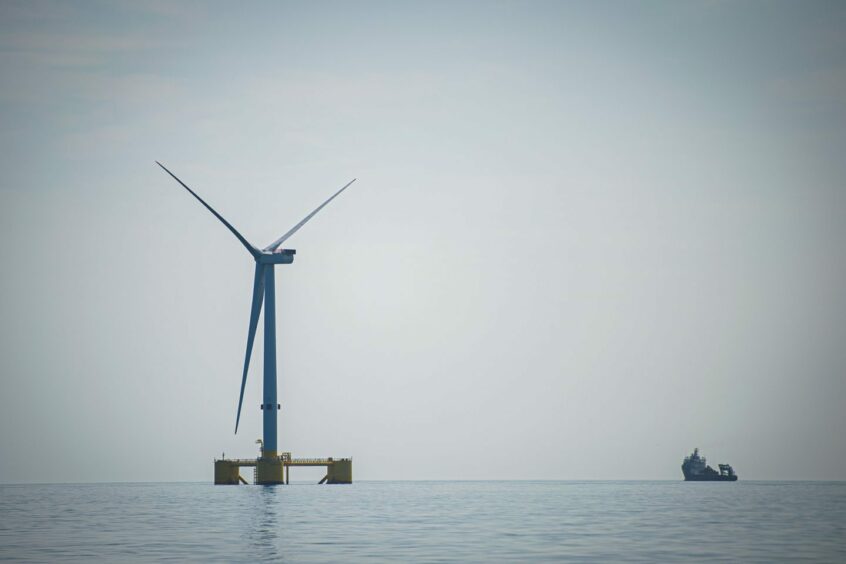 © Supplied by Wullie Marr/ DCT
© Supplied by Wullie Marr/ DCT The Global Underwater Hub (GUH) has called for additional government support for the UK’s developing floating offshore wind industry.
The trade and industry body said that the scale of floating offshore wind is worth £270 billion to the UK’s economy domestically, with a serviceable export market of £1 trillion.
But this requires urgent investment in research, development and innovation to take advantage of the opportunity.
GUH chief executive Neil Gordon said: “We’ve made a clear and compelling case to government as to why the underwater industry is of national strategic importance and why investment in this industrial sub-sector should be prioritised.
“Unlike fixed offshore wind in shallow waters, where large parts of the manufacture and fabrication have gone overseas, floating offshore wind is a nascent technology in more hostile and challenging conditions.
“But it’s one in which the UK has a very real competitive advantage – a subsea industry, with over fifty years’ offshore experience, whose technology and expertise are sought-after globally and which leads the way in dynamic undersea cables, moorings and anchoring systems, not to mention their installation, operation and maintenance.”
In its response to Invest 2035, the government’s industrial strategy consultation, the GUH set out what the underwater industry will need to take advantage of the “unprecedented” opportunity presented by floating offshore wind and maximise economic value for the UK.
Project certainty, speedier and less complicated consenting, and investment in research and development, port infrastructure and grid capacity are among the requests of government.
More support and investment are required to increase academic research to commercialise new science and technology and enable early-stage technology companies to scale up.
In addition, the GUH called for specific innovation funding to develop cables and electrical systems, foundations and anchoring systems along with next-generation installation, operation and maintenance methods using AI and machine learning-based predictive maintenance.
Investment in digital technology should be focused on the development and adoption of unmanned and remote solutions, data collection for consenting, remote operation and maintenance surveys and protection against cyber and physical attack.
It also said that investment in port infrastructure is crucial for floating offshore wind, which requires large, deep-water ports.
The UK currently has very few ports which can support manufacturing of cables and construction assembly and integration of floating offshore wind. Delivering the necessary upgrades to those that can, will require significant investment and time to deliver ahead of project construction.
Finally, the GUH said that significant upgrades and reinforcements are needed for the grid to accept the dramatic increase in energy from offshore renewables wind and generate revenues for investors.
The UK government must provide a timeline and demand signals in order to attract grid investment, it added.
As part of efforts to drive the development of the UK’s floating offshore wind sector, the GUH recently partnered with Scottish Enterprise to promote the country’s subsea supply chain as a global centre of excellence for the technology.
The two groups aim to help the UK’s existing oil and gas underwater supply chain transition to support floating wind.
The sheer scale of what is proposed in offshore wind makes it one of the biggest industrial opportunities in a generation, Gordon said.
“But if the UK underwater industry is unable to meet the demand for subsea technology and services, due to a lack of investment, we will become a caretaker of other nations’ technology and expertise rather than an innovator and major supplier,” he said.
“We have a unique opportunity to create thousands of new green jobs, transfer oil and gas jobs into renewables, build vital domestic infrastructure and win export orders. Prioritising and investing in the UK’s underwater industry will help accelerate the transition of our oil and gas supply chain and cement the UK as an international centre of excellence.
“Not only will it secure our energy supply but also protect critical underwater energy and communications infrastructure. Given the heightened threat from rogue nations, the underwater battlespace has become an area of high priority for the UK and wider NATO allies.”

